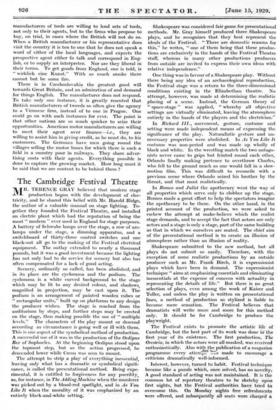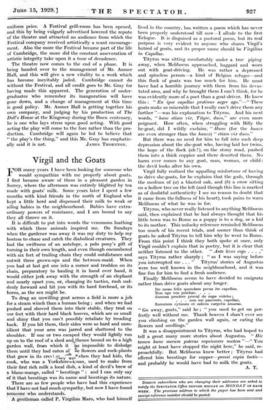The Cambridge Festival Theatre M R. TERENCE GRAY believed that modern
stage production began with the development of elec- tricity, and he shared this belief with Mr. Harold Ridge, the author of a valuable manual on stage lighting. To- gether they founded the Festival Theatre, and installed an electric plant which had the reputation of being the most " modern ". ever used in England for stage purposes. A battery of Schwabe lamps over the stage, a row of arc- lamps under the stage, a dimming apparatus, and a switchboard of thirty-three control switches and one black-out all go to the making of the Festival electrical equipment. The outlay extended to nearly a thousand pounds, but it was a good investment because the lighting has not only had to do service for scenery but also has often compensated for a lack of good acting. Scenery, ordinarily so called, has been abolished, and in its place are the cyclorama and the podium. The cyclorama is a white curved background to the stage which may be lit to any desired colour, and shadows, magnified in projection, may be cast upon it. The podium is an arrangement of painted wooden cubes or " rectangular units," built up on platforms to any design the producer wishes. The stage is reached from the auditorium by steps, and further steps may be erected on the stage, thus making possible the use of " multiple levels." The characters of the play mount or descend according as circumstance is going well or ill with them. This is one aspect of the symbolical method of production. A successful use of it was in the production of the Oedipus Rex of Sophocles. At the beginning Oedipus stood upon the iopmost step, but as the action progressed, he descended lower while Creon was seen to mount. The attempt to strip a play of everything inessential, leaving only what has a dramatic or symbolical signifi- cance, is called the presentational method. Being expe- rimental, it is entitled to forgiveness for any puerility, as, for instance, in The AddingMachine when the murderer was picked out by a blood-red spotlight, and in As You Like It when the morality of it was emphasized by an entirely black-and-white setting. - Shakespeare was considered fair game for presentational methods. Mr. Gray himself produced three Shakespeare plays, and he recognizes that they best represent the ideals of the Festival. " There are domestic reasons for this," he writes, " one of them being that these produc- tions are exclusively in the hands of the Festival Theatre staff, whereas in many other productions producers from outside are invited to express their own ideas with relative independence:" One thing was in favour of a Shakespeare play. Without there being any idea of an archaeological reproduction, the Festival stage was a return to the three-dimensional conditions existing in the Elizabethan theatre. No attempt, however, was made at determining the realistic placing of a scene. Instead, the German theory of " space-stage " was applied, " whereby all objective settings are virtually eliminated, leaving the atmosphere entirely in the hands of the players and the electrician.' In Richard III., movement, gesture, costume and setting were made independent means of expressing the significance of the play. Naturalistic gesture and un- necessary properties were abolished. In As You Like It costume was non-period and was made up wholly of black and white. In the wrestling match the two antago- nists never came to grips but feinted round each other, Orlando finally making pretence to overthrow Charles, who fell to the ground much as one would fall in a slow- motion film. This was difficult to reconcile with a previous scene where Orlando seized his brother by the throat, and that most realistically. In Romeo and Juliet the apothecary went the way of all properties which serve only to clobber up the stage. Romeo made a great effort to help the spectators imagine the apothecary to be there. On the other hand, in the printed account of the production, we were asked to eschew the attempt at make-believe which the realist stage demands, and to accept the fact that actors are only actors and a stage is only a stage, part of the same building as that in which we ourselves are seated. The chief aim of the presentational method is to create an illusion of atmosphere rather than an illusion of reality. Shakespeare submitted to the new method, but all plays do not submit so easily. Therefore, with the exception of some realistic productions by an outside producer such as Mr. Frank Birch, it is expressionist plays which have been in demand. The expressionist technique " aims at emphasizing essentials and eliminating inessentials at the expense of concern with actuality in representing the details of life." But there is no great selection of plays, even among the work of Kaiser and Toiler, and unless the play is written on presentational lines, a method of production so stylized is liable to become mere sensation. The Festival believes that dramatists will write more and more for this method only. It should be for Cambridge to produce the playwright. The Festival exists to promote the artistic life of Cambridge, but the best part of its work was done the first year of its existence. The first production, The Oresieia, in which the actors were all masked, was received enthusiastically. Also withthe publication of a magazine programme every atter4t-' made to encourage a criticism dramatically well-informed. Interest, however, turned to habit. Festival technique becaine like a puzzle which, once solved, has no novelty. A good standard of acting was not maintained. It is the common lot of repertory theatres to be sketchy upon first nights, but the Festival authorities have tried to overcome this. On Monday nights free refreshments were offered, and subsequently all seats were charged a uniform price. A Festival grill-room has been opened, and, this by being vulgarly advertised lowered the repute of the theatre and attracted an audience from which the Festival company received artistically a scant encourage- ment. Also the more the Festival became part of the life of Cambridge, the more did the constant asseveration of artistic integrity take upon it a tone of decadence.
The theatre now comes to the end of a phase. It is being handed . over to the managethent of Mr. Anmer Hall, and this will give a new vitality to a work which has become ineyitably jaded. Cambridge cannot do without the Festival, and all credit goes to Mr. Gray for having made this apparent. The generation of under- graduatei who remember its inauguration will have gone down, and a change of management at this time is good policy. Mr. Ammer Hall is getting together his own company, and judging by his production of The Doll's House at the Kingsway during the Ibsen centenary, he is one who lays stress upon good acting. With good acting the play will come to the fore rather than the pro- duction. Cambridge will again be led to believe that " the play's the thing," and this Mr. Gray has emphatic-







































 Previous page
Previous page